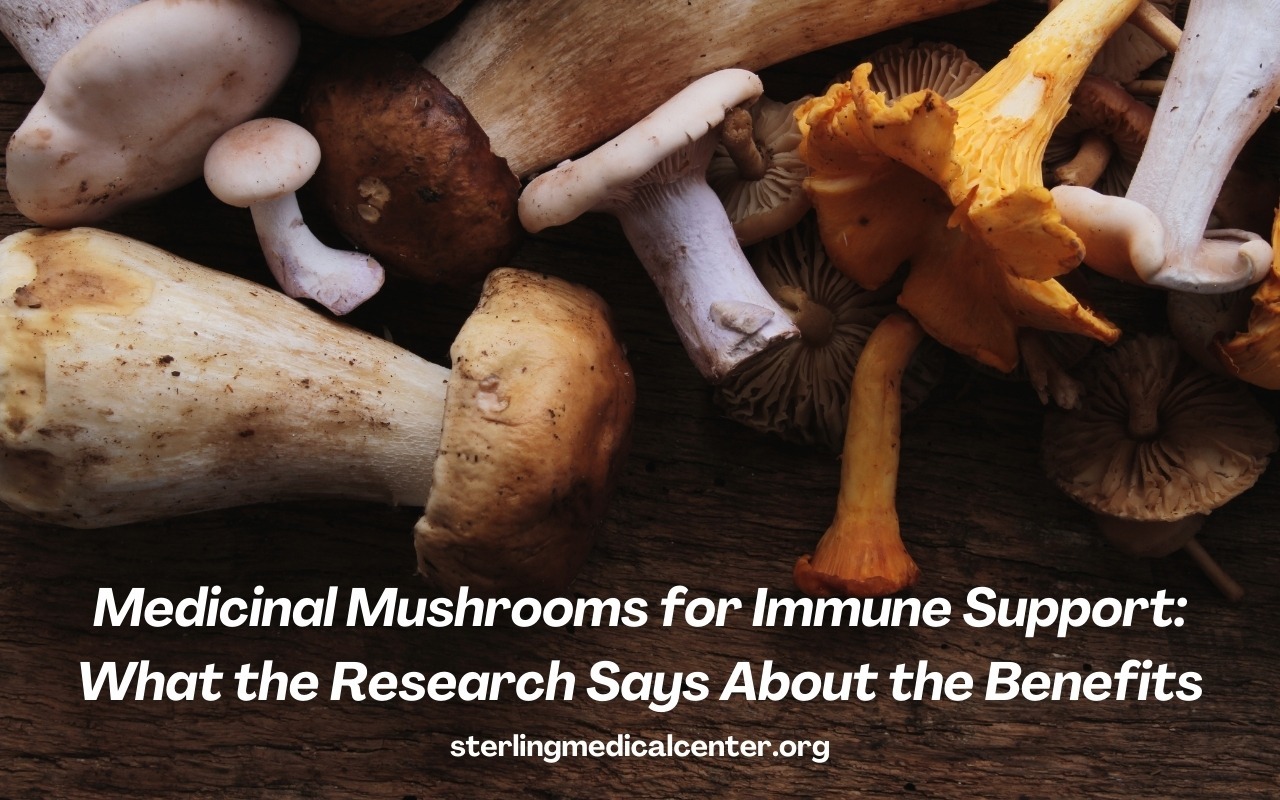
The use of medicinal mushrooms in health and wellness has a long history, with origins in Traditional Chinese Medicine (TCM), Ayurveda, and Indigenous healing practices. Today, extensive scientific research supports the therapeutic potential of these fungi, particularly for immune support, inflammation regulation, and overall health maintenance. As integrative and functional medicine gain traction, medicinal mushrooms are emerging as valuable tools for supporting immunity and wellness naturally.
At SterlingMedicalCenter.org, our team is committed to analyzing the latest clinical findings to provide evidence-based insights into natural health solutions. This article examines the immune-boosting properties of medicinal mushrooms, their key bioactive compounds, and how they function to enhance immune resilience.
The Immune-Boosting Properties of Medicinal Mushrooms
Medicinal mushrooms contain a wealth of bioactive compounds, including polysaccharides (such as beta-glucans), triterpenoids, and antioxidants. These compounds have been extensively studied for their immunomodulatory effects, meaning they can help balance and enhance immune function.
Key Immune Benefits of Medicinal Mushrooms:
- Enhancing immune cell activity – Stimulating T-cells, natural killer (NK) cells, and macrophages to improve immune response.
- Regulating inflammation – Controlling cytokine production and reducing excessive inflammatory responses.
- Providing antioxidant protection – Neutralizing free radicals that can damage immune cells and contribute to chronic disease.
- Supporting gut microbiome health – Promoting beneficial gut bacteria, which are critical for immune regulation.
- Boosting resilience against infections – Strengthening the body's natural defenses against pathogens.
The Top Medicinal Mushrooms for Immune Support
1. Lion’s Mane (Hericium erinaceus) – Brain and Immune Function
Lion’s Mane is widely recognized for its neuroprotective benefits, but emerging research also highlights its immune-boosting properties. Studies suggest that the polysaccharides in Lion’s Mane can enhance gut-associated lymphoid tissue (GALT), which plays a crucial role in immune defense.
How It Supports Immunity:
- Stimulates macrophages, which help eliminate pathogens.
- Supports the gut microbiome, crucial for immune function.
- Contains antioxidants that reduce inflammation.
Best Ways to Use:
- Powder or capsule, added to smoothies, coffee, or soups.
- Recommended daily intake: 500-1000 mg.
2. Reishi (Ganoderma lingzhi) – The Immune Regulator
Reishi, often called the “Mushroom of Immortality,” is one of the most well-researched fungi for immune health. It contains high levels of beta-glucans and triterpenoids, which modulate immune function and help the body adapt to stress.
How It Supports Immunity:
- Enhances T-cell and NK-cell activity.
- Reduces chronic inflammation and oxidative stress.
- Supports the body's adaptive immune response.
Best Ways to Use:
- Taken as a tea, tincture, or capsule.
- Recommended daily intake: 1000-2000 mg.
3. Cordyceps (Cordyceps militaris) – Energy and Immune Support
Cordyceps is known for its ability to increase ATP production, providing energy at the cellular level. It also has immunomodulatory properties that support the body's ability to fight infections.
How It Supports Immunity:
- Enhances cytokine response to infections.
- Supports lung health and respiratory function.
- Boosts immune cell function and energy metabolism.
Best Ways to Use:
- Powdered extract or capsules.
- Recommended daily intake: 500-1000 mg.
4. Chaga (Inonotus obliquus) – Antioxidant and Immune Protection
Chaga is one of the most powerful natural sources of antioxidants, which play a critical role in immune defense by reducing oxidative stress and supporting cellular function.
How It Supports Immunity:
- Contains high levels of beta-glucans that enhance immune cell response.
- Supports gut microbiome health and reduces inflammation.
- Protects against oxidative stress, which can weaken immunity.
Best Ways to Use:
- Brewed as a tea or taken as an extract.
- Recommended daily intake: 500-1000 mg.
5. Turkey Tail (Trametes versicolor) – Immune and Gut Health
Turkey Tail is one of the most researched mushrooms for immune health due to its high concentration of polysaccharopeptides (PSP) and polysaccharide-K (PSK), which stimulate immune function.
How It Supports Immunity:
- Enhances T-cell function and NK-cell activity.
- Supports gut health by promoting beneficial microbiota.
- Helps regulate immune responses to infections.
Best Ways to Use:
- Capsules or tea.
- Recommended daily intake: 1000-2000 mg.
6. Shiitake (Lentinula edodes) – Cardiovascular and Immune Benefits
Shiitake mushrooms contain a polysaccharide called lentinan, which has been shown to enhance immune function by activating macrophages and T-cells.
How It Supports Immunity:
- Boosts immune cell function and response to infections.
- Contains ergothioneine, a powerful antioxidant that protects immune cells.
- Supports cardiovascular health, which is closely linked to immune function.
Best Ways to Use:
- Culinary use or supplements.
- Recommended daily intake: 1000 mg.
7. Maitake (Grifola frondosa) – Immune and Metabolic Support
Maitake mushrooms contain beta-glucans that have been shown to stimulate immune cell production and support metabolic health.
How It Supports Immunity:
- Stimulates macrophages and NK cells for pathogen defense.
- Supports blood sugar regulation, which is essential for immune balance.
- Contains antioxidants that reduce inflammation.
Best Ways to Use:
- Powder or capsule form.
- Recommended daily intake: 1000-2000 mg.
Understanding Medicinal Mushroom Supplements for Immunity
Fruiting Body vs. Mycelium-Based Supplements
Many mushroom supplements contain mycelium grown on grain rather than the actual mushroom (fruiting body). Research indicates that fruiting bodies contain higher concentrations of immune-boosting beta-glucans, while mycelium-based products often contain fillers with lower bioactivity.
Choosing a High-Quality Mushroom Supplement
- Look for fruiting body extracts rather than mycelium-based powders.
- Verify beta-glucan content through third-party testing.
- Ensure organic certification to avoid contaminants.
- Avoid supplements with grain fillers or starch.
Final Thoughts: Strengthening Immunity with Medicinal Mushrooms
Medicinal mushrooms provide a natural and research-backed way to support immune function, reduce inflammation, and promote overall wellness. With their ability to enhance immune resilience and modulate immune responses, these fungi have earned their place in functional medicine.
When selecting a mushroom supplement, choosing high-quality fruiting body extracts ensures maximum potency and efficacy. By incorporating these powerful mushrooms into your daily routine, you can take proactive steps toward long-term immune health and overall well-being.
Related: Turmeric and Your Health